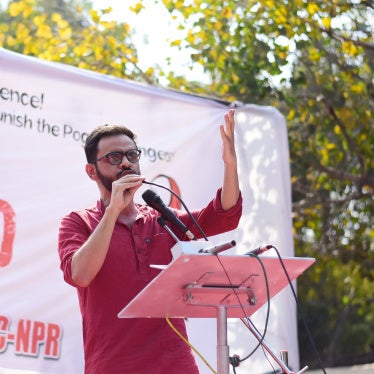China's detention of four intellectuals of Chinese descent with ties to America poses a serious challenge to U.S.-China relations. Two are accused of spying, although no evidence has been produced to justify the charges. They may all be victims of internal Chinese politics, or pawns in a game Beijing is playing to test the new administration of President George W. Bush.
Nevertheless, the detentions have sent a shock wave through the international academic community, causing many researchers worry about the risks of working in China. And frustration in the U.S. Congress is building at a time of growing tensions between Beijing and Washington.
President Bush should immediately send a personal representative to Beijing to discuss the plight of the detained intellectuals, their legal status and humanitarian needs. Currently, there is no American ambassador in Beijing. Former President Bill Clinton's ambassador, Joseph Prueher, has returned home, and his replacement has yet to be confirmed. Other urgent cases should also be on the agenda, including that of Liu Yaping, a businessman and permanent U.S. resident detained in Inner Mongolia, whose Chinese lawyers say is extremely ill.
Mr. Bush has publicly appealed for "fair treatment" and due process for the detainees, but thus far China seems to feel no obligation to listen. Beijing is gloating over two recent diplomatic victories. Last month, the Chinese delegation mustered support among the 53 members of the United Nations Commission on Human Rights to quash a U.S.-sponsored resolution critical of China's human rights performance. Once again, China escaped censure.
Then on May 8 the U.S. lost its seat on the commission, giving Beijing even more reason to brag. The official Chinese state-run media blasted U.S. "arrogance" and bullying. Loss of its seat in Geneva, the media said, was due to America's "long-biased condemnation of other countries using the camouflage of human rights." Looking tough in a tug of war with Washington helps boost the image of Chinese President Jiang Zemin and the current leadership while it is engaged in a succession struggle.
Meanwhile, the detention of the four scholars has put the White House in a bind. Li Shaomin, an American citizen educated at Princeton University and professor of business at City University in Hong Kong, was charged with spying May 15. Also accused of spying is Gao Zhan, a permanent U.S. resident and researcher at American University in Washington, D.C. The others being held, inexplicably and without charge, are Wu Jianmin, a U.S. citizen, and Qin Guangguang, a permanent resident. They have all been denied access to lawyers and family members.
This kind of treatment is hardly unusual in a system in which what passes for law is arbitrarily applied, where there are no precise definitions of "spying" and "state secrets," and no independent judiciary. The U.S. State Department has warned that Chinese security officials may be deliberately targeting Chinese-American citizens or residents, especially those who have criticized Beijing or visited Taiwan.
Perhaps China intends to interrogate then release the four just in time for the July 13 decision on Beijing's bid to host the Olympic Games in 2008. Equally possible is that they could face secret trials and prison terms, with few prospects for release any time soon.
But the U.S. does have some leverage. The president's envoy should make it clear that these detentions could spoil the atmosphere for Mr. Bush's attendance at the Asia-Pacific Economic Cooperation forum in Shanghai in October. The administration also should indicate that Mr. Bush will be unable to accept an invitation for a state visit to China unless Beijing clarifies the alleged wrongful acts committed by the four intellectuals and releases those held solely for the exercise of their rights of belief, free expression and association. Mr. Bush should also insist on broader progress on human rights and religious freedom prior to any state visit.
The U.S. Congress can help. A new Congressional-Executive Commission is being formed to deal with human rights in China, as mandated by the law on permanent normal trade relations adopted last year. The chair of the commission is Sen. Chuck Hagel, a strong supporter of trade with China. Mr. Hagel and other key members of Congress should send a clear message to Jiang Zemin that resolving these cases and taking other significant steps to improve human rights are essential for building a positive relationship with the United States.
China's leaders can't afford to let relations with the U.S. -- an important source of trade and investment -- spiral out of control. It is in China's own long-term interest to limit the damage already done by these detentions.
Mike Jendrzejczyk is Washington Director of Human Rights Watch's Asia Division.








